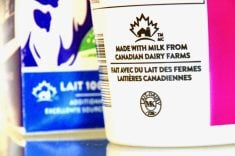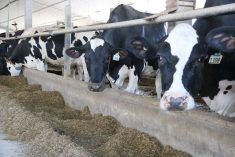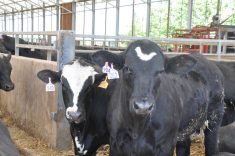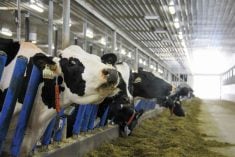Dairy Farmers of Manitoba chair David Wiens minced no words in his address to the organization’s annual general meeting earlier this month.
“This has been one of the most dramatic years,” he told the assembled delegates.
He was of course mainly referencing the recently negotiated United States-Mexico-Canada Agreement (USMCA) and how it has affected the industry.
In fact, all of the speeches at the AGM were dominated by the recent concessions Canada made at the expense of the dairy industry. There was some muted hope that U.S. President Donald Trump may fail to get the deal ratified south of the border, but most were resigned to the new reality that is going to emerge from this trade deal.
Read Also

Pig transport stress costs pork sector
Popular livestock trailer designs also increase pig stress during transportation, hitting at meat quality, animal welfare and farm profit, Agriculture and Agri-Food Canada researcher says
For dairy producers, it isn’t a pretty picture. The concessions Canada made include:
- The opening up between 3.6 per cent (government numbers) and 3.9 per cent (dairy industry estimate) of the Canadian market to U.S. products;
- The elimination of “Class 7” milk category (that set a price for surplus non-fat milk solids);
- A limit on Canadian milk protein exports; and
- An oversight clause, that requires Canada to inform the U.S. of any changes to industry legislation prior to it being implemented.
While there was clearly a lot of frustration evident and the language being used at the meeting was quite strongly oppositional, the consensus seemed to be that the industry should look ahead and learn from what had happened. Wiens even saw a silver lining of sorts in the strong public support the industry has seen in recent months.
“When we talk about dairy or about supply management, a lot of people are getting to know more about it than they ever have,” he said. “We weren’t looking for the attention, but let’s try to take advantage of it.”
One of the things Wiens wants to take advantage of is the groundswell of patriotism surrounding Canadian milk that has been growing since the USMCA deal was announced.
“We know from a recent survey that Canadians want Canadian milk,” he said. “We have their support and the fact that we have Canadians on side gives us strong reason to have hope for the future.”
However, he noted that the industry has to work together to turn that hope into reality.
“Unity is more important than ever,” said Wiens.
The other concept that was hammered home during the speeches was that no more ground should be given up and that Canada’s supply management system must be maintained.
Jacques Lefebvre, chair of the Dairy Farmers of Canada, noted his board of directors has prepared three points that they want to persuade all parties to commit to. First, ensure that producers will face no net negative impact as a consequence of the agreement; second, that the government commits to a strategy to make sure that dairy has a place in the economy of Canada in the future; and finally, that the federal government commits to no further concessions in future trade agreements.
Lefebvre also stressed the importance of getting the Canadian consumer on board. The DFC owns the “blue cow” logo, which is placed on milk products to indicate the product was made in Canada from Canadian milk. He noted that logo requests are up 400 per cent in the wake of USMCA.
“Third-party validation will be key to achieving our success,” he said.
Some of the strongest language of the afternoon came from Alistair Johnston, chair of the Canadian Dairy Commission.
“The system that we have, that is the hill I think we have to die on,” he said. “It’s stood the test of time and it’s worth defending. It’s worth fighting for.”




















